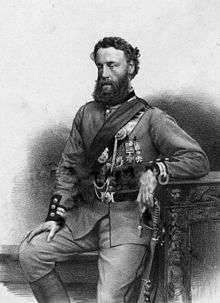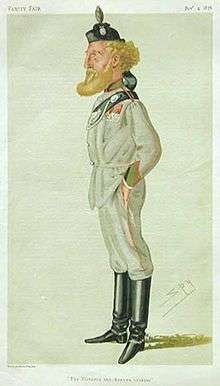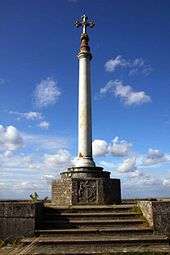Robert Loyd-Lindsay, 1st Baron Wantage
| The Lord Wantage | |
|---|---|
 Robert Loyd-Lindsay c.1882 | |
| Born |
17 April 1832 Berkeley Street, Mary-le-bone |
| Died |
10 June 1901 (aged 69) Wantage, Oxfordshire |
| Buried at | Ardington Church (Vault) |
| Allegiance | United Kingdom |
| Service/branch | British Army |
| Rank | Brigadier General |
| Unit |
1st Battalion, Scots (Fusilier) Guards Honourable Artillery Company Home Counties Brigade 1st Volunteer Battalion, Princess Charlotte of Wales's (Royal Berkshire Regiment) |
| Battles/wars | Franco-Prussian War (Red Cross) |
| Awards |
Victoria Cross Knight Commander of the Order of the Bath Volunteer Officers' Decoration Commander of the Legion of Honour (France) Knight of the Order of the Medjidie (Ottoman Empire) 3rd Class Order of the Crown, 3rd Class with Cross of Geneva (Prussia) |
| Other work |
Member of Parliament for Berkshire Financial Secretary to the War Office Lord Lieutenant of Berkshire |
Brigadier General Robert James Loyd-Lindsay, 1st Baron Wantage, VC, KCB, VD (17 April 1832 – 10 June 1901) was a British soldier, politician, philanthropist, benefactor to Wantage, and one of the founders of the British National Society for Aid to the Sick and Wounded in War (later the British Red Cross Society), for which he crucially obtained the patronage of Queen Victoria.
Background
Lindsay was born in 1832, the second son of Lieutenant General Sir James Lindsay, 1st Baronet and Anne, daughter of Sir Coutts Trotter, 1st Baronet. His elder brother Coutts Lindsay succeeded his maternal grandfather as second Baronet in 1837 (see Lindsay Baronets). In 1858, he married The Honorable Harriet Sarah Jones-Loyd, the only surviving child and heiress of Samuel Jones-Loyd, 1st and last Baron Overstone,[1] one of the richest men in the country, who endowed the couple with a considerable fortune and the Lockinge Estate near Wantage.
Military service

Lindsay fought as a captain in the Scots (Fusilier) Guards during the Crimean War. He was awarded the Victoria Cross for his actions on 20 September 1854 at the Battle of the Alma and 5 November at the Battle of Inkerman. The London Gazette described his actions as follows:
When the formation of the line of the Regiment was disordered at Alma, Captain Lindsay stood firm with the Colours, and by his example and energy, greatly tended to restore order. At Inkerman, at a most trying moment, he, with a few men, charged a party of Russians, driving them back, and running one through the body himself.[2]
On 9 November 1858[3] Lindsay was appointed as Equerry to HRH The Prince of Wales and served as such before resigning on 7 February 1859.[4] The brief period as Equerry was due to his engagement and impending marriage to The Honorable Harriet Sarah Jones Loyd.
Lindsay was later involved in the volunteer movement, serving as Colonel of the Royal Berkshire Volunteers, and subsequently Brigadier-General of the Home Counties Brigade. He was one of the first recipients of the Volunteer Officers' Decoration.[5] He was also Lieutenant Colonel of the Honourable Artillery Company from 13 November 1866[6] to 17 August 1881.[7]
Career in public life

Lindsay sat as Conservative Party Member of Parliament for Berkshire from 1865[8][9][10][11] until 1885[12] and served under Lord Beaconsfield as Financial Secretary to the War Office between 1877 and 1880.[1] He was appointed a Knight Commander of the Order of the Bath (KCB) in 1881.[13] In 1885 he was elevated to the peerage as Baron Wantage, of Lockinge in the County of Berkshire.[14] He then served as Lord Lieutenant of Berkshire from 1886 until his death.[15] Having been initiated as a freemason, passed and raised in Malta en route to the Crimea in 1854, he became Provincial Grand Master of Berkshire from 1898 until his death in 1901. He was appointed the first Chairman of the Council of the National Rifle Association of the United Kingdom on 25 November 1890.[16]
Personal life
Lord and Lady Wantage lived at Lockinge House at East Lockinge in Berkshire (now Oxfordshire).[17] He died on 10 June 1901, aged 69. On his death, Florence Nightingale, a close personal friend since the Crimea wrote:
Lord Wantage is a great loss but he had been a great gain. And what he has gained for us can never be lost. It is my experience that such men exist only in England. A man who had everything (to use the common phrase) that this world could give him, but who worked as hard, and to the last, as the poorest able man and all for others for the common good. A man whose life makes a great difference for all. All are better than if he had not lived, and this betterment is for always it does not die with him. That is the true estimate of a great life. God bless him and we will bless him. And we will bless God for having made him.
Lady Wantage erected a monument to Lord Wantage on the Ridgeway. There are various inscriptions on the faces of the monument with the one on the North East side, being in Latin and is similar to that inscribed on the Iona Cross on Gibbet Hill, Hindhead, Surrey, namely:
- IN OBITU PAX
- POST OBITUM SALUS
- POST TENEBRAS LUX
- IN LUCE SPES
Which translates as: “Peace in passing away. Salvation after death. Light after darkness. Hope in light."
As he had no children the title died with him.[1] In 1908 Lady Wantage officially opened Wantage Hall, the first Hall of Residence in the University of Reading, in honour of Lord Wantage. She died in August 1920.[1]
References
- 1 2 3 4 thepeerage.com Lt.-Col. Robert James Lindsay-Loyd, 1st and last Baron Wantage of Lockinge
- ↑ The London Gazette: no. 21971. p. 657. 24 February 1857.
- ↑ "Supplement to the London Gazette". London Gazette. 1858-11-23. Retrieved 2011-03-05.
- ↑ "Supplement to the London Gazette". London Gazette. 1859-02-08. Retrieved 2011-03-05.
- ↑ "Supplement to the London Gazette". London Gazette. 1892-12-06. Retrieved 2011-03-04.
- ↑ "Supplement to the London Gazette". London Gazette. 1866-11-13. Retrieved 2011-03-04.
- ↑ "Supplement to the London Gazette". London Gazette. 1881-08-16. Retrieved 2011-03-04.
- ↑ "Supplement to the London Gazette". London Gazette. 1865-07-25. Retrieved 2011-03-05.
- ↑ "Supplement to the London Gazette". London Gazette. 1868-12-01. Retrieved 2011-03-05.
- ↑ "Supplement to the London Gazette". London Gazette. 1874-02-03. Retrieved 2011-03-05.
- ↑ "Supplement to the London Gazette". London Gazette. 1880-04-13. Retrieved 2011-03-05.
- ↑ leighrayment.com House of Commons: Bedford to Berwick upon Tweed
- ↑ The London Gazette: no. 24976. p. 2674. 24 May 1881.
- ↑ The London Gazette: no. 25493. p. 3426. 24 July 1885.
- ↑ leighrayment.com Peerages: Waddington to Welles
- ↑ Original Charter of National Rifle Association of the United Kingdom
- ↑ 1901 Census.
External links
| Wikimedia Commons has media related to Robert Loyd-Lindsay, 1st Baron Wantage. |
- Hansard 1803–2005: contributions in Parliament by Robert Loyd-Lindsay
- Location of grave and VC medal (Oxfordshire)
- Royal Berkshire History: Colonel Sir Robert James Loyd-Lindsay, Baron Wantage of Lockinge
- Profile
| Parliament of the United Kingdom | ||
|---|---|---|
| Preceded by Philip Pleydell-Bouverie John Walter Richard Benyon |
Member of Parliament for Berkshire 1865–1885 With: Richard Benyon 1865–1876 Sir Charles Russell, Bt 1865–1868 John Walter 1868–1885 Philip Wroughton 1876–1885 |
Constituency abolished |
| Political offices | ||
| Preceded by Hon. Frederick Stanley |
Financial Secretary to the War Office 1877–1880 |
Succeeded by Henry Campbell-Bannerman |
| Honorary titles | ||
| Preceded by The Marquess of Ailesbury |
Lord Lieutenant of Berkshire 1886–1901 |
Succeeded by James Herbert Benyon |
| Peerage of the United Kingdom | ||
| New creation | Baron Wantage 1885–1901 |
Extinct |